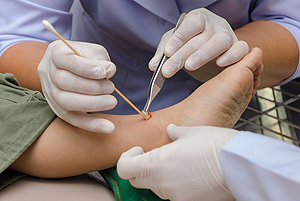Wounds can occur on any part of the body but they are especially common on the feet and lower legs, especially in people who have diabetes. Often, a combination of diabetes, poor circulation, and peripheral neuropathy can lead to slow-healing wounds forming on the lower limbs and going unnoticed for a period of time due to a lack of sensation. This can increase the chances of the wound becoming infected. Symptoms of infection include increased pain, redness, warmth, and swelling around the wound, yellow or green discharge or an unpleasant odor from the wound, fever or chills, aches, pain, nausea and vomiting. If you have wounds showing signs of infection, it is strongly recommended that you seek treatment as soon as possible. If you have diabetes and are prone to foot wounds, a podiatrist can help you maintain the health of your feet.
Wound care is an important part in dealing with diabetes. If you have diabetes and a foot wound or would like more information about wound care for diabetics, consult with Leonora Fihman, DPM from California. Our doctor will assess your condition and provide you with quality foot and ankle treatment.
What Is Wound Care?
Wound care is the practice of taking proper care of a wound. This can range from the smallest to the largest of wounds. While everyone can benefit from proper wound care, it is much more important for diabetics. Diabetics often suffer from poor blood circulation which causes wounds to heal much slower than they would in a non-diabetic.
What Is the Importance of Wound Care?
While it may not seem apparent with small ulcers on the foot, for diabetics, any size ulcer can become infected. Diabetics often also suffer from neuropathy, or nerve loss. This means they might not even feel when they have an ulcer on their foot. If the wound becomes severely infected, amputation may be necessary. Therefore, it is of the upmost importance to properly care for any and all foot wounds.
How to Care for Wounds
The best way to care for foot wounds is to prevent them. For diabetics, this means daily inspections of the feet for any signs of abnormalities or ulcers. It is also recommended to see a podiatrist several times a year for a foot inspection. If you do have an ulcer, run the wound under water to clear dirt from the wound; then apply antibiotic ointment to the wound and cover with a bandage. Bandages should be changed daily and keeping pressure off the wound is smart. It is advised to see a podiatrist, who can keep an eye on it.
If you have any questions, please feel free to contact our offices located in Encino and Brentwood, Los Angeles, CA . We offer the newest diagnostic and treatment technologies for all your foot care needs.

